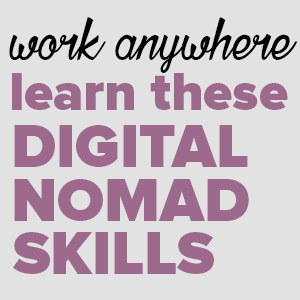This is a guest post written by Sheeroh Murega Kiarie, on how to become a transcriptionist. The views and opinions expressed in this article are those of the author and does not necessarily constitute the views or opinions of Fulltime Nomad.
Are you part of the epic movement?
In just 3 years, about 50% of the American and UK labor market will be grossing their toils online as freelancers, according to the US Bureau of Labor Statistics and freelance marketplace Upwork.
And it is not just in the US and UK that communities of bold, ambitious and skilled people are offering services online for decent pay. It is also happening around the globe.

Free MEGA Guide
86 Ways to Make Money Online
Download our free guide on legitimate ways to make money online in 2021
By signing up, you are agreeing to receive periodic emails from Fulltime Nomad. No spam. Only the good stuff.
The gargantuan segment of the current crop of online freelancers plies its trade as writers, software developers and design crafters.
But these are but a few of the in-demand freelance jobs. Have you heard about freelance transcription work?
You can make money online transcribing as a freelance career and bolt off on your way to making $25 an hour transcribing. With the proliferation of video and podcasting, transcription jobs are also on the rise.
Here’s everything you need to know about how to become a transcriber.
Related posts:
**This post may contain affiliate links. If you click on them and purchase something we get a small percentage of the sale. More info here**
How to Become A Transcriptionist: 9 Tips
1. Invest in learning— it pays
If you are coming in as a beginner, you might want to start by learning the ropes in freelance transcription work.
You probably can relate to this.
You are browsing the web for that amazing podcast. When you get to listen to it, you realize it’s quite rushed yet you’d hoped for a less-paced session.
Often, the next step is to check around if the podcaster was thoughtful enough to come up with a text-only version of the podcast. That way you can read the pages at your convenience and speed.
All smart podcasters do.
If you want to become a transcriptionist and deliver transcripts that your clients actually like, you’d be working with such clientele; podcasters, journalists, etc.
Consider joining a professional transcribers’ forum such as Transcription Essentials.
You’ll discover a wealth of helpful information and transcription hacks from veteran professionals who make money transcribing, to help you build your skill set.
Such forums and mentors will provide you with an online community where you can vent your journey’s frustrations and celebrate wins together. A community of actual people who really get it.
It helps knock out the creeps of solitary engagements in your transcription home office.
Transcription Courses
As a transcription newbie, it can also be very helpful to take online courses. These courses will help you understand what transcription work is and guide you on how to be a transcriptionist. Check out these top courses:
- How to Transcribe and Excel in General Transcription
- Transcription Skills – Learn Beginning to Advanced Skills
- General Transcription – Theory and Practice
See also: Work from Anywhere with These 25 Money Making Digital Nomad Skills
2. Speed up your typing
If you already hit about 40 words per minute (WPM) on the keyboard, you are at a good start.
Ideally, 60 WPM will help you deliver transcripts quicker and make your clients happy. Happy clients equal great reviews and recommendations, hence more work to catapult your transcribing career.
If you type below 40 WPM, you’ll want to practice your way up. Most audio and video files take between 3-5 hours to convert to text. And the faster (and accurately) you type out, the better income you’ll earn with your transcription work – so it helps to be fast.
3. Grammar matters
Check your grammar. It is essential if you want to make money transcriving.
This will help you distinguish similar-sounding words and expressions (homophones) but ones that have different meanings.
This is one of the most important bits of advice I give newbies who ask me how to become a transcriptionist – strive to polish your grammar and written communication skills.
You’ll need the skill to proofread after your typing marathons. Superb transcribers learn the ins and outs of good grammar and usage.
4. Listening skills are key for transcription work
Listening devotedly helps fuel your typing intent. You’ll need to practice listening keenly to hear what you need to transcribe.
You’ll be transcribing a range of audios, ranging from one speaker sermons, to focus group interviews and you’ll need to differentiate who is who.
You might also receive audio files that have a bit of background noise, and a good ear will come in handy here.
5. The right transcription software can help you through
When you’re just getting started, you might want to use a free transcribing software. You can decide whether to invest in paid software and tools when you are positive that freelance transcription work is a job you want to pursue long-term.
Check out Express Scribe and Inqscribe for resourceful suites that can grow with you. Both empower you to set hotkeys on your keyboard. So you can use those to pause, stop, slow, speed, forward or back-track audio to your convenience.
6. Prep up for a wholesome venture
As a transcriber, you get all these exciting projects to collaborate on. You team up with great clients in many fields.
From internet marketers to philosophic and religious sermons, to recorded interviews of awesome people, you’ll want to keep an open mind for the landscape ahead.
Transcription work is a rich career in terms of learning different subjects and ways of thinking every day. If this is one of your desires, you’ll find transcription fulfilling—so keep an open mind.
7. Check out what type of transcription the client needs
Some clients will want the final transcripts you submit to be edited for filler words. Those include ‘uhs’ and ‘mhs’ and false starts, for example. This is referred to as clean verbatim transcription.
Other clients request that you type out the audio word for word – think job interviews, where the interviewer wants to hear every word the interviewee used and how they express themselves unedited. This is referred to as full verbatim transcription.
So be sure to ask your client what type of transcript they need before starting on the project.
8. Is it general, legal or medical transcription?
There are more types of transcriptions but from another perspective.
General transcription work involves typing out audio or video files that cover all manner of industries and topics, such as business, entertainment, self-development, and so on.
Legal and medical transcription encompasses the practice of converting audio and video files to written form, with the added knowledge of legal and medical terminology (sometimes practice).
9. Where to get online transcription work
Of course the most common question about how to become a transcriptionist is: where can you find online transcription jobs?
After you’ve committed to the tips above, it’s time to relish the rewards. Now, to scale your earning potential, you’ll need good clientele.
Rev, TranscribeMe, Tigerfish, as well as freelancing sites such as Upwork, are but a few of the sites where you can legitimate transcription work.
Many clients also search for virtual assistants to do their transcription work so keep an eye out for virtual assistant jobs as well.
See also: 52 Best Freelance Jobs Websites to Help You Find Online Work
The nine essential bits of advice on how to become a transcriptionist are the tips to help you top up your freelancing ambition; if freelance writing, software development, and design are not what you are looking for.
Like this article? Share it on Pinterest.

You might also be interested in:
- How to become a freelance writer
- How to become a copywriter
- Earn Money Online
- Earn Money While Travelling
Written by
Sheeroh Murega Kiarie
Sheeroh Murega Kiarie blogs at techmoneymama.com, a blog that helps people identify legitimate ways of making money online.
Want to write for us? Email us your idea at [email protected].













Speeding up your typing is more than essential, it’s often overlooked, so the more you type the better you get at it… there are some courses helping with this, just Google search online…